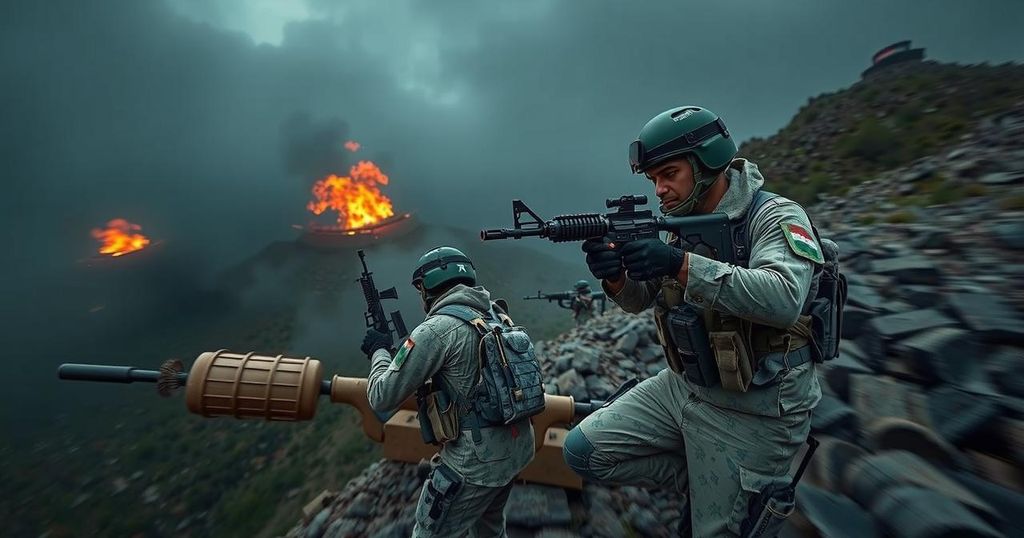Global news
ABBAS ARAGHCHI, AFRICA, ARA, ARAGHCHI, ARMY, ASIA, ASSAD, BASHA, BO, CONFLICT, DAMASCUS, EUROPE/ASIA, HAYAT TAHRIR AL - SHAM, HTS, IDLIB, IRAN, MIDDLE EAST AFFAIRS, MILITARY, MILITARY OPERATIONS, REFUGEE CRISIS, RUSSIA, SIERRA LEONE, SYRIA, SYRIAN CIVIL DEFENSE, SYRIAN CIVIL WAR, SYRIAN OBSERVATORY FOR HUMAN RIGHTS, TEHRAN
Marcus Li
0 Comments
Iran-Backed Iraqi Militias Enter Syria to Support Assad’s Government Amid Insurgent Assault
Iranian-backed Iraqi militias have entered Syria to support the government against a recent insurgent assault on Aleppo led by Hayat Tahrir al-Sham (HTS). Approximately 200 fighters crossed through the Bou Kamal border, bolstering Syrian military operations while airstrikes target insurgent positions. Concurrently, Iranian Foreign Minister Abbas Araghchi affirmed support for President Assad, signaling complex regional dynamics amid fears of a broader conflict.
Iranian-backed Iraqi militias have transitioned into Syria to provide crucial support to the Syrian government amid a severe counteroffensive against an insurgent onslaught that recently resulted in the capture of Aleppo, the nation’s second largest city. The move aims to strengthen the capabilities of the Syrian military, which is currently facing significant challenges in regaining territorial control after insurgents, primarily from the jihadi group Hayat Tahrir al-Sham (HTS), initiated an aggressive assault on Aleppo and its adjoining regions.
Reports indicate that approximately 200 Iraqi militiamen crossed into Syria via the strategic Bou Kamal border crossing overnight, traveling in pickup vehicles to reinforce the Syrian army’s operations against the advancing insurgents. An anonymous official associated with these militias emphasized the increasing involvement of these forces in supporting President Assad’s regime. In response to the insurgent advances, the Syrian military has established fortified defensive positions in northern Hama while conducting airstrikes to target rebel-held territories.
In an effort to maintain pressure on rebel forces, coordinated Syrian and Russian airstrikes have intensified in regions like Hama and Idlib, where reports from the Syrian Civil Defense reveal that at least 10 civilians lost their lives as a result. Iranian Foreign Minister Abbas Araghchi visited Damascus, where he reiterated Iran’s steadfast commitment to backing the Syrian government against escalating tensions, signaling the ongoing geopolitical complexities in the region.
Despite insurgent threats to march towards Damascus, everyday life in the Syrian capital seemed largely unaffected, although the situation in southeastern Aleppo remains dire, marked by civilian evacuations and fuel shortages. The resurgence of hostilities has sparked concerns regarding a potentially destabilizing new front in an already tumultuous Middle East, where existing conflicts involving states such as Israel, Turkey, and Russia compound the volatility of the situation.
The scenario underscores not only the intricate nature of the Syrian conflict but also the profound implications it may hold for broader regional dynamics should confrontations escalate further, especially between major powers vested in the area.
The recent escalation of conflict in Syria has been heavily influenced by the involvement of various external actors, notably Iran and Russia, who have long supported President Bashar al-Assad’s regime. With the resurgence of armed groups like Hayat Tahrir al-Sham, the Assad government faces mounting pressure. This maneuver by Iranian-backed Iraqi militias reflects the strategic alliances formed to counter insurgent advances and maintain governmental authority. Additionally, the geographical and political complexities are profound, as the actions of multiple state and non-state actors intertwine with local dynamics, further complicating efforts towards stability in the region.
In conclusion, the entry of Iranian-backed Iraqi militias into Syria represents a critical development in the ongoing conflict, suggesting a sustained effort by Tehran to support the Assad regime against insurgent forces. The humanitarian toll, exemplified by civilian casualties from airstrikes, highlights the dire situation on the ground. Moreover, the interplay of various regional powers raises the potential for broader conflict, making it imperative for the international community to monitor developments closely and explore avenues for peace and stability in the Middle East.
Original Source: www.newsweek.com




Post Comment